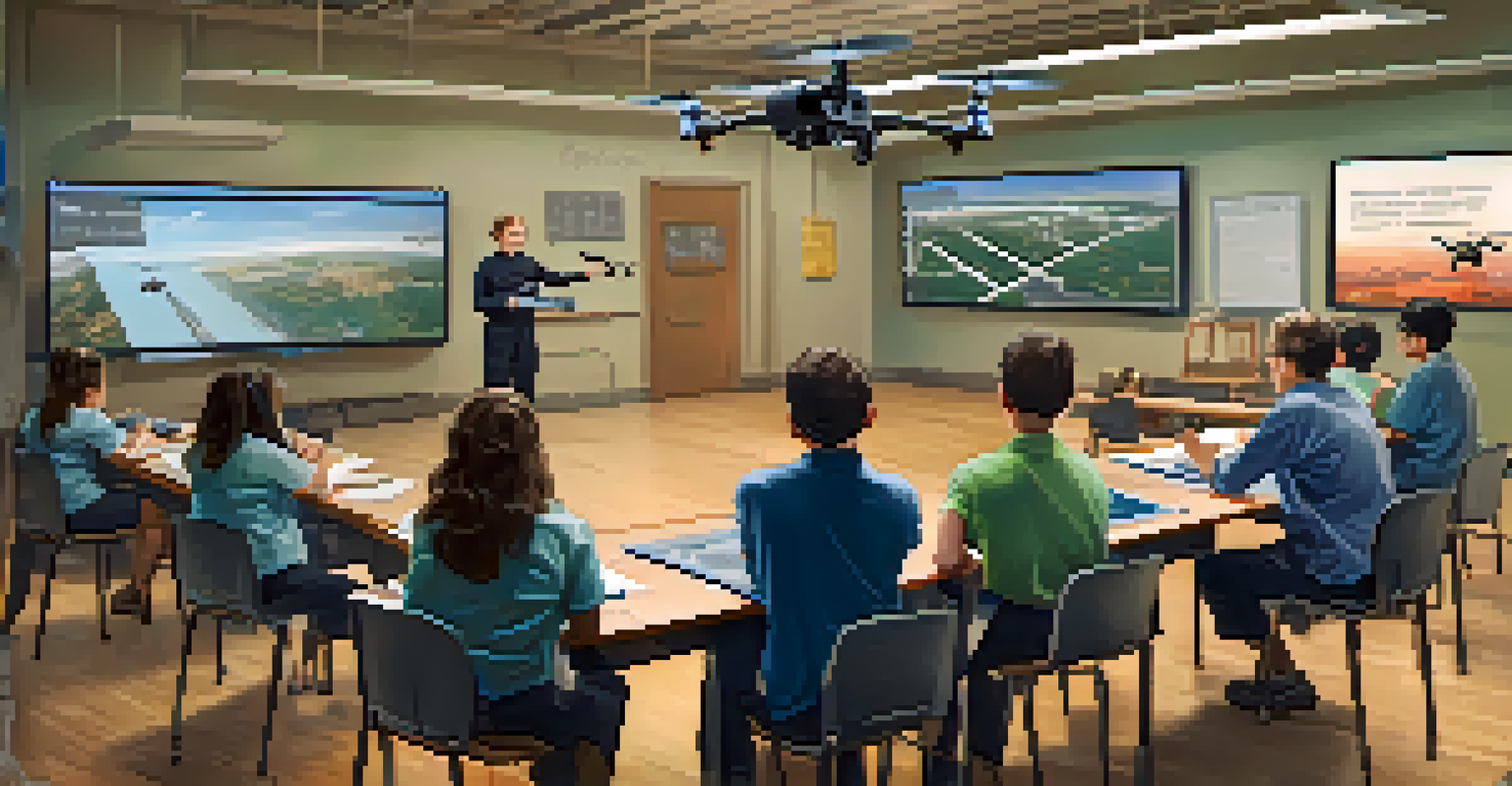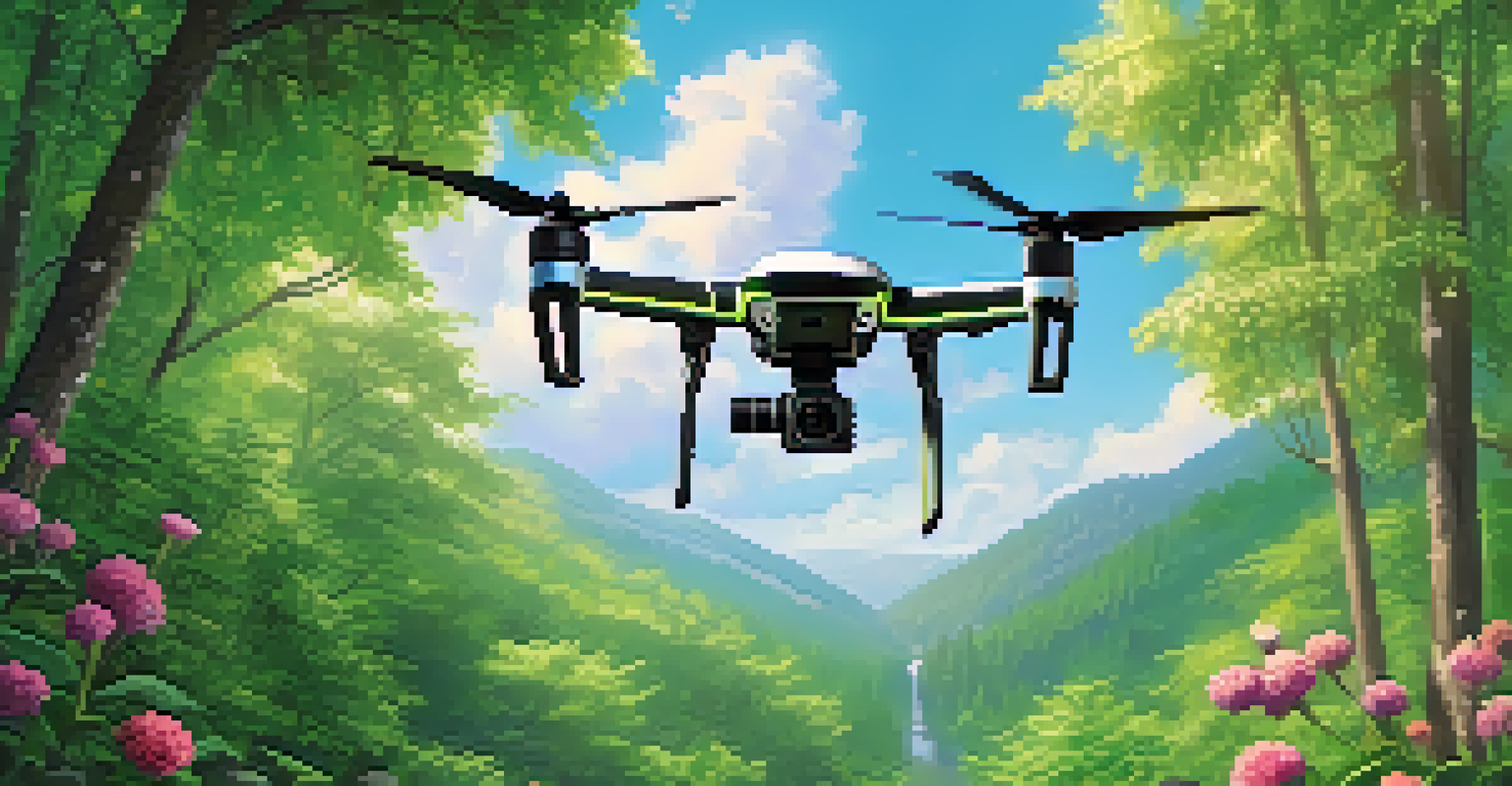The Ethical Implications of Using Drones for Educational Purposes

Understanding Drones in Educational Settings
Drones have become increasingly popular in educational environments, offering unique opportunities for hands-on learning. From aerial photography to environmental studies, they provide a dynamic way to engage students. However, as we embrace these technologies, it's essential to consider their broader implications within the classroom.
The technology we use can shape our understanding of the world around us.
Using drones can enhance STEM education, allowing students to explore concepts in real-time. Imagine a group of students using drones to map out their schoolyard, applying math and science in a practical setting. Yet, with these advancements come questions about privacy, safety, and the ethical responsibilities of educators.
As we integrate drones into curricula, we must also ensure that both students and teachers understand the ethical considerations. This includes respecting privacy, obtaining permissions, and considering the impact on the community. Balancing innovation with responsibility is key to making the most of this educational tool.
Privacy Concerns and Student Safety
One of the most pressing ethical issues surrounding drone use in education is privacy. Drones equipped with cameras can inadvertently capture images or videos of individuals without their consent, raising concerns about surveillance. Schools must navigate these complexities to protect students and staff and maintain trust within the community.

Moreover, student safety is paramount when operating drones. Ensuring that students are trained properly and understand the guidelines is crucial to preventing accidents. This includes not only flying the drones safely but also being mindful of where they are flying to avoid trespassing or causing harm.
Drones Enhance Hands-On Learning
Drones offer unique, practical opportunities for students to engage with STEM concepts through real-world applications.
Educators must establish clear policies regarding drone usage to address these privacy and safety concerns. By doing so, they can create a responsible framework that encourages innovation while protecting the rights and well-being of everyone involved.
Equity and Access to Drone Technology
Equity is another significant ethical consideration when discussing drones in education. Not all students have equal access to technology, which can create disparities in learning opportunities. Schools in affluent areas may have the resources to implement drone programs, while underfunded institutions may struggle to provide similar experiences.
With great power comes great responsibility.
This inequity can lead to a gap in skills and knowledge among students, ultimately impacting their future prospects. It's crucial for educational institutions to find ways to bridge this divide, ensuring that all students can benefit from drone technology. Partnerships with community organizations or grants could be effective strategies to enhance access.
By addressing equity in drone education, we can foster a more inclusive environment that empowers every student. This not only promotes fairness but also enhances the overall learning experience, allowing diverse perspectives to thrive in the classroom.
Regulatory and Legal Implications of Drones
The use of drones in education is subject to various regulations and legal frameworks. Educators must be aware of the laws governing drone operation, which can vary by location. Understanding these rules is crucial to ensuring compliance and avoiding potential legal issues.
For instance, some jurisdictions require permits or specific training for drone operators, especially in populated areas. Schools must navigate these regulations to implement drone programs effectively and legally. This entails not only adhering to local laws but also educating students about the legal responsibilities that come with drone operation.
Ethics and Safety Are Crucial
Integrating drones in education requires careful consideration of privacy, safety, and ethical responsibilities to protect students and the community.
By fostering an understanding of regulatory implications, educators can prepare students for responsible drone use. This knowledge equips them with skills that extend beyond the classroom and into the real world, emphasizing the importance of following ethical and legal standards.
Environmental Considerations in Drone Use
Drones can play a significant role in environmental education, offering students the chance to study ecosystems from above. However, the environmental impact of drones must also be considered. For example, noise pollution and potential disturbances to wildlife can pose ethical dilemmas for educators and students alike.
When using drones for environmental studies, it’s vital to assess how their use affects the surrounding area. Educators should encourage students to think critically about both the benefits and potential drawbacks of drone usage. This holistic understanding fosters environmentally responsible behavior among future generations.
By integrating environmental considerations into drone education, schools can promote sustainability. Teaching students to respect the ecosystems they study reinforces the importance of ethical stewardship in technology use.
Fostering Ethical Responsibility in Students
As drones become a staple in educational settings, fostering ethical responsibility in students is crucial. Educators have the unique opportunity to instill values such as respect for privacy and understanding the implications of surveillance technology. These lessons can shape how students view technology in the broader context of society.
Encouraging discussions about ethical dilemmas surrounding drone usage helps students develop critical thinking skills. They can analyze scenarios, debate perspectives, and consider the consequences of their actions. This process not only enhances their educational experience but also prepares them for future challenges.
Equity in Access is Essential
Ensuring all students have access to drone technology is vital for creating equal learning opportunities and bridging educational disparities.
Ultimately, teaching students to be responsible drone operators means equipping them with the ability to navigate ethical complexities in technology. This foundation empowers them to make informed decisions, not just about drones but in all aspects of their lives.
The Future of Drones in Education
Looking ahead, the future of drones in education is full of potential, but it also demands careful consideration of ethical implications. As technology evolves, so too do the challenges and responsibilities associated with its use. Educators must remain proactive in addressing these issues to create a positive learning environment.
Innovations in drone technology could lead to even more exciting educational applications, such as virtual reality integration or advanced data collection methods. However, each new advancement brings new ethical questions that must be addressed. Anticipating these challenges will be key to ensuring that drone use remains a beneficial tool in education.

By maintaining an open dialogue about the ethical implications of drones, educators can foster a culture of responsibility and innovation. This collaborative approach will not only enhance educational experiences but also prepare students for a future where technology and ethics go hand in hand.